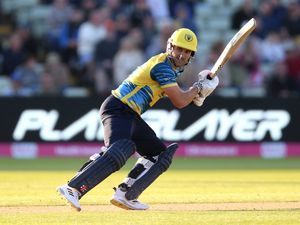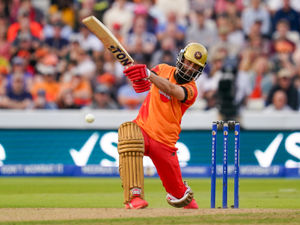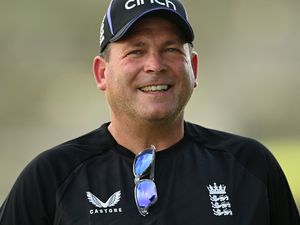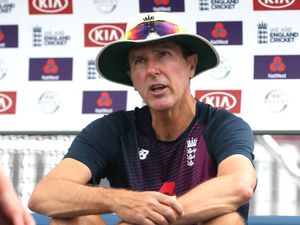England's Wolverhampton born coach Chris Guest bowled over by World Cup starlets
For Chris Guest the past few months have been among the most hectic yet rewarding of his life.
From the moment he took the phone call confirming his selection as England head coach for the inaugural under-19s women’s World Cup, it was all systems go, right up to the point his team faced India in the final in Potchefstroom, South Africa just under a fortnight ago.
“It was a special moment when I got the call,” says Wolverhampton-born Guest, former captain and director of cricket at Fordhouses and now head coach of Lightning, the East Midlands’ regional women’s team.
“The last three months, from a personal level, have been massively rewarding. To lead your country out at a World Cup final, there aren’t many people who can say they’ve done that.”
The seven-wicket final defeat to India was bruising yet now back in the UK and having had time to reflect, Guest’s focus is the bigger picture and the tournament’s overwhelmingly positive impact on himself, his players and the women’s game overall.
“If you look at the final in isolation, we were pretty disappointed with how we performed,” he admits.
“But when you consider the girls had not come together since the start of November and had not played a game together before we got out there, achieving what we did was pretty special.”
A 15-strong squad which had no shortage of Midlands interest in the shape of Kingswinford’s Hannah Baker, Wednesfield’s Davina Perrin and Bridgnorth’s Ellie Anderson met every weekend up until Christmas, before flying out in the second week of January.
They opened the tournament with a crushing 174-run win over Zimbabwe, which Guest believes may be the biggest margin of victory ever recorded by an England XI in a T20 international.
“It was impressive how quickly the group gelled together over such a short space of time,” he says. “They all had each other’s backs.
“From the start it was outlined we were going there to try and win the tournament but it wasn’t solely about that. It was also about giving different opportunities to players.
“Because we hadn’t played before getting out there, we were consciously making sure we gave chances to different people.
“We knew any make up of that 15 could perform. The challenge came when they all did and we had to leave four of them out. That made it very tough.”
While skipper Grace Scrivens plundered 293 runs and was named player of the tournament, there were countless valuable contributions throughout the squad on the way to the final.
They included a five-wicket haul for Anderson in a win over the West Indies, while leg spinner Baker took three wickets and was named player of the match in the thrilling semi-final win over Australia. The 18-year-old, who did not play in the demolition of Zimbabwe as Guest and his coaching staff rotated the squad, would later be included in the team of the tournament.
That semi-final victory, which saw England defend a target of just 100, ranks as Guest’s proudest moment in the sport.
“The feeling after that was simply unmatched,” he says. "I’ve had great experiences before but a World Cup semi-final when you only put 99 on the board and win by three runs, the feeling immediately after that game was pretty special.
“I can’t imagine much getting close to that. The fight the girls showed when they were out there was unbelievable.”
Guest continues: “The vast majority had never played overseas before. A good number had never played in a stadium. At least two-thirds, if not more, had never played a TV game.
“There were experiences in the tournament which were bigger than just cricket. Whether that be interviews pre-game and post-game, being away from home for a month, previews and reviews of games. There was a lot they hadn’t experienced before which was a big learning curve.
"On top of what we achieved it was just great to see the growth of the women’s game, teams like Rwanda beating the West Indies, Bangladesh beating Australia. The game is broadening its horizons and maybe it can tap into areas the men’s game can’t?"
Guest believes the challenge now is for players to use their experiences as they look to build successful careers in a women’s game which has never before been alive with so much opportunity.
The first-ever women’s Indian Premier League is due to take place next month, while the world's best players will again descend on England in August for the third edition of The Hundred.
Baker and Perrin, meanwhile, will be among 40 new full-time professional players in the English game this summer – double the number who played last year – after signing deals with the West Midlands regional team Central Sparks.
Perrin, 16, is the youngest female player to sign a pro deal and was already well known to Guest, having made her debut for Fordhouses’ first XI when he was still the club’s director of cricket.
“I’ve known Dav almost since she was born,” he says. “I coached her first cricket session at Fordhouses and it is so rewarding to see how she is developing.
“She’s the only member of the U19s squad who will be young enough to go to the next U19s World Cup in Malaysia and Thailand two years from now.”
“Working in the women’s game over the last few years you see a real determination among players to try and make it a profession for themselves,” he continues.
“That is where I see it going, with squads becoming fully professional and players not having to make calls between whether they need to work or play cricket.
“The game in England has grown massively. The fixture list has doubled this year. The biggest thing we need is getting competitive cricket into players, so they can learn how do you handle those big moments.
“From the under-19s points of view, we didn’t really come up against that until the semi-final. Creating moments where you have best v best is a massive part of moving that forward.
“Girls are showing that if they have opportunity, funding and time you will see the game grow and grow.”





